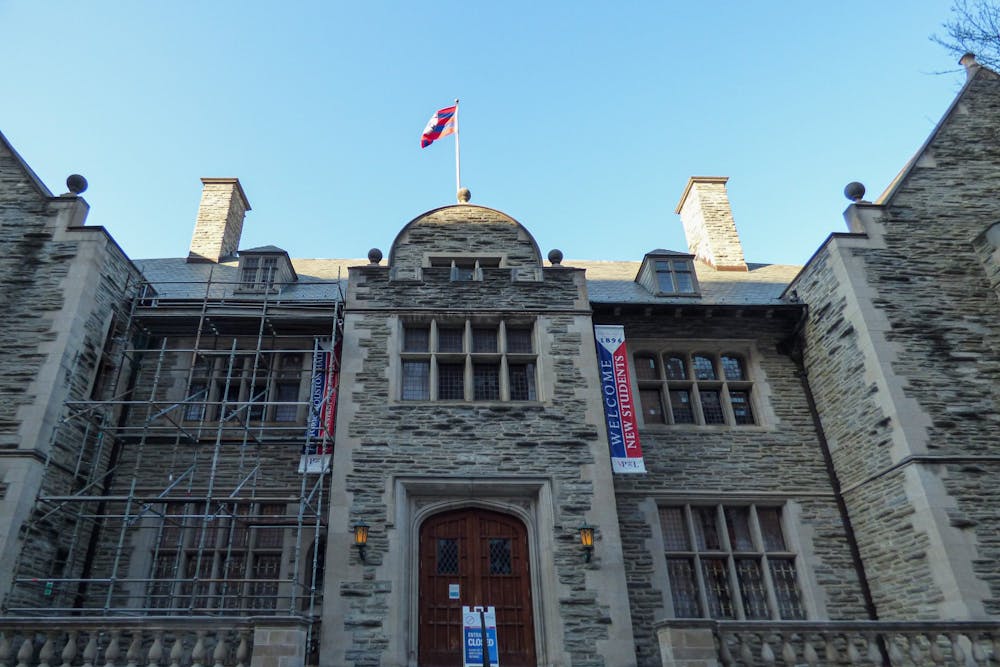
Penn students and staff who are involved in religious and spiritual life on campus said that they've received support, and experienced a welcoming environment.
The Spiritual and Religious Life Center — which is located in Houston Hall — houses the Office of the Chaplain, serves as the home base for religion and spirituality at Penn. It provides space for prayer, scripture study, and meditation sessions. Students can also use SPARC as a meeting space, or stop by to talk to a chaplain.
"It's important to have spaces that encourage reflection, contemplation, and bigger picture conversations," Senior Associate Chaplain and Director of SPARC Steve Kocher said. "That’s a big part of what I try to offer for students, and that’s one of the contributions that the religious and spiritual spaces on campus provide.”
The Office of the Chaplain aims to serve two main purposes in the Penn community; it acts as a confidential resource for students, staff, and faculty to receive support, and as a resource center, collaborating with all on-campus religious and spiritual communities.
The chaplain, Rev. Chaz Howard, helps these groups with event planning, offers funding support through the FAITH fund, and works with interfaith student groups like Programs for Religious, Interfaith, and Spiritual Matters.
PRISM is a student-led organization that holds interfaith collaborative events between different religious and spiritual groups on campus to build connections across different communities.
This past spring, PRISM held an interfaith Shabbat dinner at Hillel and an Iftar during Ramadan. PRISM also hosts its own events, including a leadership gathering every semester where leaders from different groups come together and brainstorm ideas for interfaith events.
“Talking to the other leaders is very enriching because you really get to know how these other religious groups at Penn are, and their dynamic, and what they need, what they have, what they can offer. You can see how everyone is connected in the way that we want to help each other,” said College sophomore and PRISM member Mishael Majeed.
Members of several religious groups echoed this sentiment, adding that the purpose of their groups is always to provide a welcoming community for all students who want to get involved.
“We don’t want anyone to feel like they’re not religious enough or not Jewish enough," Assistant Director of Penn Hillel Jenna Ferman said. "You don’t even need to be Jewish to be in this building all the time, to be studying here and eating here and getting involved.”
In addition to hosting various religious communities, such as the Orthodox Community at Penn and the Reform Jewish Community, Penn Hillel also houses the Kosher Falk dining hall. Students come to the building not only for religious pursuits, but also to connect to Judaism culturally and spiritually.
Wharton junior and member of the Newman Center Emma Koskovich said, "We’re here to help you and welcome you and make you feel comfortable in the space.”
The Newman Center is an apostolic Catholic community that offers mass, bible studies, retreats, service opportunities, and recurring events such as Newman Dinners and Newman Nights.
“Penn’s religious community has inspired me a lot more. It’s really inspiring to see so many young people living this vibrant life and being able to see so many people finding their faith and incorporating it into their lives. My religion has grown a lot stronger because of it,” said Koskovich.
While Koskovich grew up attending church, several students said that they have joined groups on campus, even without having grown up practicing religion.
College junior and Hindu & Jain Association member Nesha Subramaniam said, "I joined HJA just for cultural reasons to learn about my culture because I grew up in a very white area.”
College junior Mohammad Rashad encouraged students to use the resources available to them in order to get involved in religious and spiritual communities.
“SPARC is a really great way to be introduced to the religious atmosphere in general. Whether it be through chaplains like Steve, or emailing the SPARC account, or being on a Listserv for SPARC, just through osmosis you’ll learn about new events and opportunities that are available,” said Rashad
In addition to Listservs, many other students and faculty recommended following specific groups’ Instagram accounts and signing up for their email lists to learn more about what they do.
Rev. Megan LeCluyse of the Christian Association said, “If you are looking for something, and the first thing you try out doesn’t feel like it’s the right fit, there are a lot of religious groups at Penn. Try a different one."
The Daily Pennsylvanian is an independent, student-run newspaper. Please consider making a donation to support the coverage that shapes the University. Your generosity ensures a future of strong journalism at Penn.
Donate






